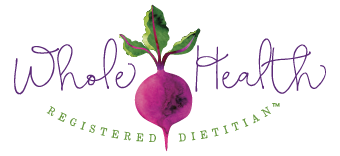Confession: I used to be a water-holic. I used to carry around a water bottle with me at all times to remind myself to be sipping throughout the day. I had a giant water bottle on my desk and my goal was always to drink two by the end of the work day. I collected expensive, patterned stainless steel water bottles. I only ever drank water (or alcohol…hey, I was in my 20s!).
I’m not alone. Americans are water guzzlers, taking the “8-glasses-a-day” (or more!) mantra to heart, even though there is ZERO evidence for that often-repeated recommendation.
“Stay hydrated” and “drink more water” seem to be the cure for any health issue. Health gurus promise weight loss, clear soft skin, shiny hair, reduced appetite, and more energy. <-Yes, much of this can happen when we are properly hydrated, but drinking water is not how we stay hydrated!
Confusing? Hear me out.
Around 2/3 of the water in our bodies is contained inside our cells in intracellular fluid. The remaining 1/3 of the water in our bodies is outside of our cells in our extracellular fluid (e.g. blood, interstitial fluid, cerebrospinal fluids).
The intracellular fluid is high in potassium and low in sodium. The extracellular fluid is high in sodium and low in potassium. Remember it by thinking how salty tears are – extracellular fluid is salty (hence saline in IVs!). In order to maintain a strong cell membrane and a stable environment in the cell, the fluid on the inside of the cell and the outside of the cell must maintain those opposite electrolyte qualities.
The body is always striving to maintain a balanced, homeostatic state. That’s really what hydration is, your body being in a homeostatic, balanced state where stress hormones are not activated. It’s important that the extracellular fluid is neither too concentrated nor too diluted. Either way can start a chain reaction resulting in cellular death, which means less ATP (energy) produced and a slower metabolism.
Luckily our bodies have a pretty ingenious way to signal when we need more and less water.
Thirst and urine color.
Overriding your body’s signals for more fluid (thirst) or less fluid (clear urine) is a surefire way to upset that balance and to keep the composition of the extracellular fluid dramatically different from the fluid in the cell. There is a trend I’ve noticed where people are trying to “pee clear.” I’m not sure why you would want to pee clear, as that is a stress response! Urine in the toilet bowl should be the color of lemonade, darker of course in a lab sample cup.
When I started learning more about minerals and physiology (body function), I realized all that water was basically diluting my body at a cellular level. Especially since I also eat foods that are watery, like fruits and vegetables. I have a hard time holding onto sodium and potassium (thanks for the info, mineral analysis!), and was kind of washing myself out.
Now, I drink when I’m thirsty. I drink water sometimes, but I also drink beverages that have minerals, such as mineral water, coconut water, coffee, milk, and orange juice, often with a pinch of salt. This works for my body and my metabolism.
To close, here is another perspective I found interesting, from a European with U.S. citizenship:
“It is my experience traveling with university students to Europe that many young Americans routinely over-hydrate, drinking water from Nalgene bottles, buying cold beverages any opportunity they can find and then stopping by Starbucks for a specialized coffee drink. And that is all extra to the normal meal hydration.
The biggest complaint I get from my students is the lack of free public restrooms that they are used to at home in shopping centers, stores, and fast food restaurants. When you over-hydrate, you also depend on regular rest stops. I note, for instance, that my French friends are likely to order an espresso at the same coffee shop where my students are ordering a 16-20 ounce drink.
One of the reasons for the American over-hydration is the level of propaganda they get regarding the need to drink several liters of water per day just to lose weight.”
*Note: In the elderly, the balance between sodium, potassium, and fluid is much harder to maintain. Fluid intake and nutrition in general has to be closer to ideal to keep from causing dehydration. Start monitoring NOW so you know what is optimal for you later in life.
*Note 2: Are you thirsty all the time AND peeing clear? That might actually have to do with blood sugar regulation. Come see me!
*Note 3: Has drinking copious amounts of water helped your health definitively? I’d love to hear from you! Because all I’ve seen in clients and in the general public is lots of peeing and lots of stress hormones.
Sources:
http://abcnews.go.com/Health/Wellness/waterlogged-america-drink/story?id=14054401
http://180degreehealth.com/your-body-is-mostly-water-not-exactly/
http://science.jrank.org/pages/1320/Cell-Death.html
https://chriskresser.com/the-water-myth/



